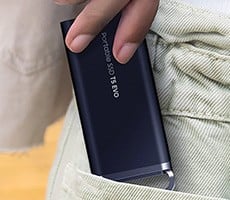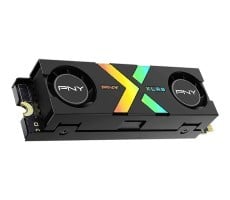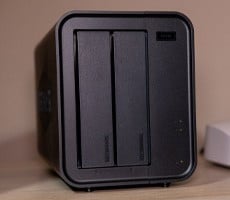Samsung T5 EVO 8TB SSD Review: Big, Rugged External Storage
Samsung T5 EVO Portable SSD: A Compact, Rugged, High-Capacity External SSD
| Samsung T5 EVO Portable SSD: Starting $159 (2TB), $599 (8TB) The recently-released Samsung T5 EVO is a compact, rugged, external USB-C SSD that's well suited to a wide array of use cases.
|
|||

|

|
||
Samsung recently expanded its line-up of external storage devices, with the T5 EVO series of solid state drives. Like the other members of the T5 family, the Samsung T5 EVO isn’t about maximum performance, but rather compatibility, reliability and high-capacity. In fact, the Samsung T5 EVO will be offered in the highest capacity of any of Samsung’s external drives, topping out at a capacious 8TB.
There are some nuances to consider with this drive, however, especially if you’re looking for something with ultra-high transfer speeds, but let’s not get ahead of ourselves. First up is a quick look at the Samsung T5 EVO’s main features and specifications, and then we’ll follow up with some benchmarks and our verdict...
Samsung T5 EVO External SSD Specs & Features

Samsung will initially be offering the new T5 EVO Portable SSD in three capacities, ranging from 2TB on up to 8TB. We’ll be focused on the 8TB model here, which is the capacity we tested, but all of the drives will offer roughly similar performance and they share the same feature set and capabilities.
Samsung’s T5 EVO Portable SSDs feature a native USB 3.2 Gen1 5Gbps interface (USB Type-C), and are outfitted with a proprietary Samsung controller and the company's latest 3D V-NAND, similar to the T9 series drives, though the T5 EVO targets a compeltely different class of user.
Samsung rates the drives for transfer speeds up to 460MB/s for reads and writes, which puts performance well below any NVMe-based drives with faster interfaces. The relatively low transfer rates offered by the T5 EVO come by way of its legacy SATA interface. As we mentioned, the T5 series isn't about maximum performance. While SATA-level throughput isn't going to knock anyone's socks off in this day and age, this drive will still crush any external HDD in terms of performance and power, and compatibility and reliability are top notch with the T5 EVO too.
All of the drives in the Samsung T5 EVO series have built in support for AES 256-bit encryption, which is enabled through the “Samsung Portable SSD” software that’s included on the drive or via the recently-released Magician 8.0 software. The Samsung Portable SSD utility is available for Windows, Android, or Mac OS, but Magician is only for Windows or Mac.
The T5 EVO’s enclosure measures 40 x 95 x 17mm, which makes it longer and taller than standard T5 drives, but much thinner. The drives have rounded edges, with a metal loop up front, and a rubberized coating all around that's soft to the touch and provides some level of shock absorbtion. Samsung rates the drives for drops up to 6ft / 2m. Unlike some of Samsung's higher-end external SSDs, however, T5 EVO drives do not carry any sort of IPx dust and water resistance rating. And a quick note on the rubberized shell -- it is an absolute dust magnet. Stick this thing in a pocket or at the bottom of a well-used laptop bag, and it's going to be covered in dust (like you see in some of our pics). It's kind of a pain to get it off too. Not a huge deal, obvisouly, but something we just wanted to point out.
At one end of the drive, there is a single USB Type-C port and an activity LED. At the other end of the drive is model and serial number information tucked away under the metal loop. The top and bottom of the drive are mostly devoid of features other than “Samsung” and “Portable SSD T5 EVO” branding.
Overall, the T5 EVO is compact, has a clean look and feels durable in the hand, though it is relatively lightweight at only 102g.
Included with the Samsung T5 EVO is some basic documentation and a 12” USB Type-C to Type-C cable. This should suffice for any modern setup, but it would have been nice to see a USB Type-C to Type-A cable included as well, like many of Samsung's other drives, to minimize the potential need for any adapters or dongles. As mentioned, Samsung's security software is included on the drive itself, or it can be downloaded from the company website, where Samsung Magician is also available.
Samsung Magician can be used to check the health status of the drive and install firmware updates, etc. We should also mention that Samsung warranties these drives for 5-years as well, which is great for a portable, external drive.
Setting up the T5 EVO to enable its security features on a Windows machine is quick in easy. Simply plug in the drive and you’re greeted by a simple Welcome screen where you’ll be able to name the drive and decide whether or not you want to enable its security features. When security is enabled, you’ll be prompted with an unlock screen when the drive is plugged in. Without entering the correct password, the main storage volume on the drive is inaccessible. Nothing fancy, but it's effective if you want to keep prying eyes off your personal data.
We should also take a moment to talk about compatibility. Anecdotally, we've also found the Samsung T5 EVO to work properly on a wide range of systems, from AMD and Intel desktops to notebooks, and cameras, which is not something we can say for every external SSD. We've had mixed results with some other drives, which caused performance, reliability and compatibility issues, especially with some NVMe enclosures. We didn't do any definitive testing in this regard, but it is something to keep in mind if you're shopping for an portable SSD and want a device that "just works".
Samsung T5 EVO External SSD Performance
In order to test the performance of the Samsung T5 EVO Portable SSD, we enlisted the help of some benchmarks and real world tests. First up is ATTO, a disk benchmark that measures sequential transfer speeds across a specific volume length with various block sizes. It measures transfer rates for both reads and writes and graphs them out in an easily interpreted chart. ATTO's workloads are sequential in nature and measure bandwidth, rather than I/O response time, access latency, etc.

Next up are some numbers with SiSoft SANDRA, the the System ANalyzer, Diagnostic and Reporting Assistant. Here, we used the Physical Disk test suite and provide the results from our comparison SSDs...

CrystalDiskMark is a synthetic benchmark that tests both sequential and random small and mid-sized file transfers using incompressible data. It provides a quick look at best and worst case scenarios with regard to SSD performance, best case being larger sequential transfers and worse case being small, random transfers.




At QD1, the Samsung T5 EVO write performance lands in the familiar positions, between the T3 adn T5. At QD32, however, the Samsung T5 EVO clearly offers better performance than the older T3, which isn't designed to handle heavier workloads like this one.
Samsung T5 EVO Portable SSD: The Verdict
Looking back through the benchmarks, it’s obvious that the Samsung T5 EVO isn’t a benchmark barn-burner. The drive’s interface is limited to SATA-like performance, so it’ll never hang with faster NVMe drives in terms of peak sequential throughput. 460MB/s, however, is still perfectly sufficient for many use cases. In addition to working well with virtually any PC or Mac, or the Samsung T5 EVO can also be used with Android devices, game consoles, and professional cameras capable of recording to external SSDs.All three capacities of the Samsung T5 EVO are currently available, at prices ranging from about $160 for the 2TB model, on up to $599 for the 8TB model featured here. At those prices, the lower-capacity drives are technically priced competitively with other external SSDs with similar capacity, but keep in mind many competitive alternatives may offer higher performance. Samsung’s own T9 4TB drive, for example, is $319 currently, whereas the 4TB T5 EVO is $310 – that would be $9 well spent. There are very few 8TB external SSDs available, however, and to assemble your own would actually cost more than the T5 EVO. So, if maximum capacity in the smallest of form factors is what you seek, the 8TB Samsung T5 EVO is a nice option.














